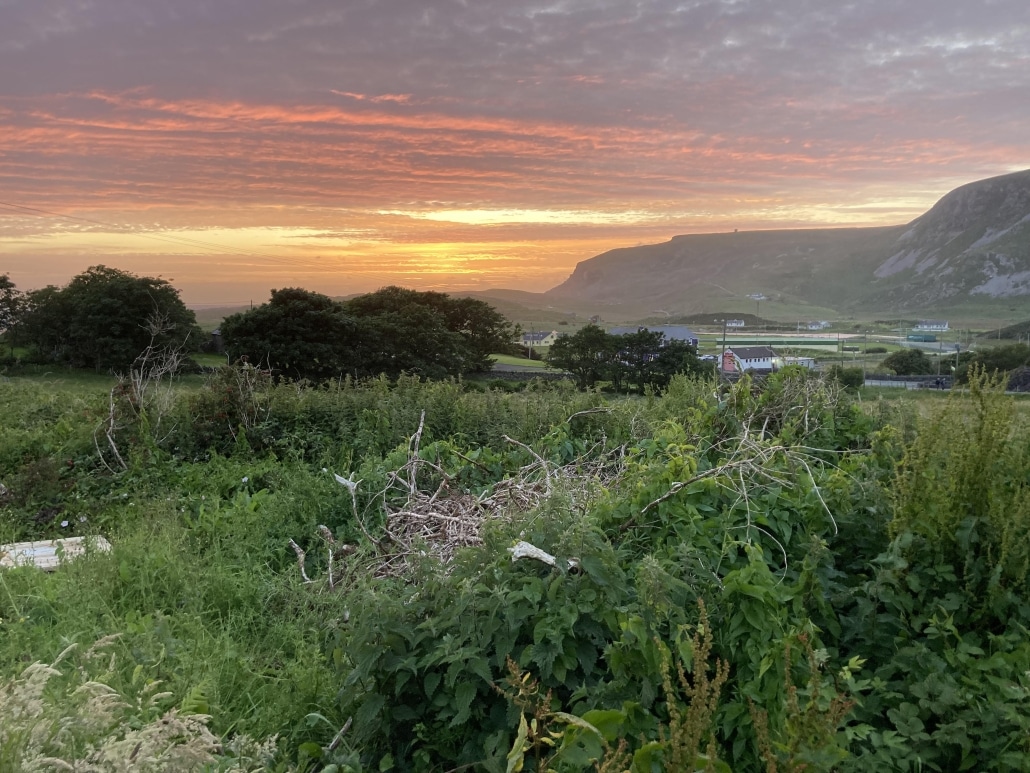No Kings Day Reflections from an American-Irish in the Home of Her Ancestors
I took off this week to come to Gaeltacht — one of the small areas on this wee island in which locals still use Irish on a daily basis — to try to learn more Gaeilge.
It’s a curious place to spend the Fourth of July.
When I decided to come here it meant little more to me than a place I could immerse myself, sort of, for a week. The blurbs said little more than that the school offered both language classes and cultural classes — things like harp playing and weaving and folklore. But being here, it has the feel of one of the Jesuit retreat centers at which my late mother guided retreats: in a stunningly beautiful remote location, where you can hear and often cannot escape from the wind and — on the occasional clear day — see the stars, and a whole rhythm to the day to facilitate a kind of contemplation.
It is a place people come to contemplate Irishness or perhaps to use Irishness as a means to contemplate.
A storyteller who performed the other day spoke about the rhythm of it all: the rhythm of the language, of the music, of the verse, of the dance, of the weaving.
It’s a place where people — Irish people, people who identify as Irish, and people who take meaning from Irishness — come to preserve and participate in those traditions that sustained Irishness during colonization. Both because of that “Saving Civilization” bit (one of Ireland’s founding saints lived here for a bit and, as is true of many places on the coast, there’s an island nearby with an old ruined monastery) and because of the recurring Irish effort to build a nation out of the oral tradition that refused to be stamped out by the British, Irishness serves as a celebrated from-ness, to people far and near, even if (and if we’re honest, partly because) Ireland went through a lot of death and misery to get there.
And so it is here in this beautiful place of from-ness that I look west and contemplate a celebration of the Colonies’ break from the same empire from which Ireland would, eventually, free itself too, free itself in significant part by building on that oral tradition. As cities cancel the celebration of defying Kings because a white man who wants to disappear all the diverse from-ness that Made America Great has started disappearing actual people, I am thinking about how this from-ness in which I’m immersed (sort of), is what my ancestors and those of millions others brought to America to make up an identity called Irish-American. That process of bringing a from-ness to (or, for Native Americans, sustaining it in) America has been replicated in thousands of ways. The part of America that is Great is the one that weaves all that diverse from-ness together into one tapestry.
As you wonder whether there is anything to celebrate, as you reflect on how Trump views the list of injuries and usurpations in the Declaration as an aspiration, not an admonition, consider the ways in which your own from-ness and those of everyone around you is both that thing that Stephen Miller is trying to kill, both figuratively and literally. But also something that can provide a rhythm to sustain you.
That’s what he wants to suffocate: The very tapestry that Makes America Great.
Is America a nation that weaves together or one that, like the British attempted but failed, stamps out?
This is a political battle. But even more it is a cultural one.
No Kings.
Note: I’m going to be really busy for the next two days so won’t be in comments. I’ll check in tomorrow night.
